Periodontal Disease
The toxins released by the bacteria in dental plaque which has accumulated along
the gum margin for a period of time irritate the periodontal tissues (tooth supporting
tissues) and lead to Periodontal Disease.
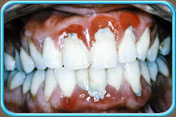
Under the following situations, you are prone to having Periodontal Disease:
Accumulation of dental plaque
Wearing dentures that are not thoroughly cleaned
Dental plaque and food debris easily accumulate in the space between the denture
and the gingivae (gum).
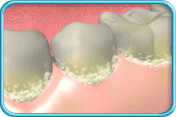
Accumulation of calculus
The rough surface of calculus allows dental plaque to build up more easily.
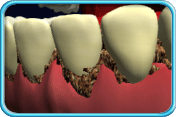
Irregular teeth
The irregular alignment of teeth makes it difficult to clean these teeth.
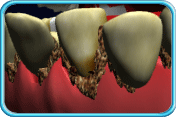
Smoking
Smokers have five times greater chance to suffer from Periodontal Disease than non-smokers
because:
Early symptoms of Periodontal Disease is less noticeable in smokers
Smoking makes early symptoms of Periodontal Disease such as swollen gums and bleeding
while brushing less noticeable because chemicals in cigarettes such as nicotine
cause blood vessel constriction. As the bleeding symptom is not obvious, it is not
easy to discover that the gingivae have been inflamed. As a result, the Periodontal
Disease will aggravate unnoticed.
Smoking lowers the body resistance and therefore lowers the healing capability of
patients with Periodontal Disease
Nicotine in cigarettes lowers the healing capability of oral tissues, retards the
healing process and causes the Periodontal Disease to worsen.

Stress
Stress lowers the body resistance towards illnesses including Periodontal Disease.
Hormonal changes during pregnancy
Because of the hormonal changes during pregnancy, the periodontal tissue of an expectant
mother is more susceptible to the irritation of toxins released by the dental plaque,
resulting in red, swollen and bleeding gums. This is called "
Pregnancy Gingivitis".
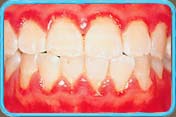
Systemic diseases
Systemic diseases such as Diabetes Mellitus, Leukaemia, and AIDS, lower the resistance
of the periodontal tissues towards bacterial infection. Bacteria inside the dental
plaque will intrude and cause Periodontal Disease if the oral cavity isn't thoroughly
cleaned. Furthermore, the healing capability is also lowered in patients suffering
from these diseases, and it is more difficult for them to recover from Periodontal
Disease. Therefore, Periodontal Disease is more progressive and severe in these
patients.
Intake of medications
Intake of medications such as anti-hypertensive and anti-convulsant drugs stimulate
the multiplication and activity of fibroblasts (a type of cells) in the gingivae
and causes gingival swelling. Dental plaque that accumulates in the swollen gingivae
is difficult to be cleaned, which leads to more gingival inflammation and further
swelling.